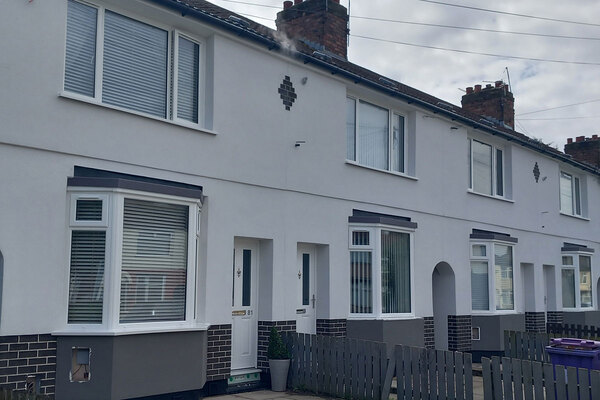ESG is still driving build-to-rent investors - despite the global backlash
From net zero to neighbourhoods, ESG has a crucial role in the UK build-to-rent boom, writes Bela Zavery, partner at law firm Womble Bond Dickinson
The UK build-to-rent (BTR) sector is evolving rapidly, with over £1.1bn invested in Q1 2025 and more than 127,000 completed homes across the country. BTR also makes up 8% of all new-build completions.
As demand for high-quality rental accommodation grows, BTR is emerging as a key solution, not only for scalable housing, but also as a catalyst for broader societal transformation. Beyond addressing supply shortages, the sector is playing a pivotal role in driving urban regeneration, revitalising neglected areas and fostering inclusive growth.
Moreover, BTR developers are increasingly committed to creating sustainable, community-focused environments, with environmental, social and governance (ESG) principles at the heart of strategic planning and investment decisions. This shift reflects a deeper industry-wide recognition that long-term value lies in developments that are not only profitable, but also resilient, responsible and people-focused.
Global political tensions surrounding net zero and ESG frameworks are escalating, particularly in the United States, where critics contend that such initiatives may undermine financial performance or inject political bias into investment strategies.
However, as revealed in our latest insight report, Building Blocks: Unlocking the Potential of UK Build-to-Rent, based on a survey of 700 developers and investors working in the BTR sector, the UK presents a markedly different narrative.
“A resounding 98% of the UK developers we surveyed continue to place sustainability at the core of their funding strategies”
A resounding 98% of the UK developers we surveyed continue to place sustainability at the core of their funding strategies. This commitment is no longer just about meeting regulatory benchmarks. It is actively driving enhanced asset performance, unlocking long-term value and amplifying profitability.
Moreover, financial returns are increasingly being realised through deep collaboration between investors and local communities. Sustainability and profitability are no longer opposing forces; they are complementary, fostering stronger local support and breathing new life into areas in need of regeneration.
Yet, challenges persist. Developers continue to cite regulatory ambiguity as a significant barrier to sustainable development. However, despite this pressure, progress has not faltered. ESG principles have become ingrained within BTR strategies and increasingly recognised as a strategic lever for unlocking both robust financial returns and measurable social impact.
Our research also confirms that UK developers see ESG as a strategic advantage: 95% say that balancing profitability with community benefit is essential, while nearly a quarter (23%) believe ESG plays a critical role in building trust and enhancing reputation.
A cornerstone of sustainable development is placemaking – the art of designing spaces that are not only functional, but also cultivate a strong sense of belonging and community. It’s no longer just about meeting basic needs; it’s about creating environments where people genuinely want to live, connect and thrive. Effective placemaking also streamlines planning processes, minimises delays and costs, and boosts profitability by aligning developments with the experiences and aspirations of local residents.
Our research shows that 46% of developers believe BTR delivers tangible value to society, and nearly two-thirds (65%) say it plays a critical role in addressing the housing crisis, with its ability to deliver key-worker housing, later-living schemes and community-focused amenities at volume.
BTR is also increasingly recognised as a driving force in revitalising town centres and supporting local communities. With its long-term investment model and focus on the creation and stewardship of high-quality environments, BTR is helping to reimagine urban spaces across the UK and turning underutilised areas into vibrant and sustainable neighbourhoods.
“Effective placemaking also streamlines planning processes, minimises delays and costs, and boosts profitability by aligning developments with the experiences and aspirations of local residents”
One example of how BTR can support placemaking is an exciting project Womble Bond Dickinson has worked on supporting BTR developer Placefirst in its high-quality housing scheme in Sunderland. The Farringdon Row project marks a significant milestone within the Riverside Sunderland masterplan, an ambitious city-centre regeneration initiative. The project will transform a 4.57-acre brownfield site into a vibrant new BTR community of 167 dwellings.
As the second residential neighbourhood in Riverside Sunderland, the development contributes to the city’s goals to deliver 1,000 new homes and one million square foot of office space in the former industrial heart of the city. The masterplan aims to double the city centre’s residential population and boost employment by 50%. The project also aligns with Sunderland’s housing strategy, which targets the construction of 7,000 new homes by 2030.
Shaping a sustainable new urban quarter, it will also include Culture House, the city library and hub with many interactive, digital features, as well as a world-class eye hospital, residential developments and office buildings. All of this is made achievable through the anchor of essential BTR investment, which plays a pivotal role in shaping future-ready communities.
As sustainability becomes a core part of funding strategies, developers are turning to private investment as a key driver of regeneration.
Nearly three-quarters (74%) of developers recognise private capital as a catalyst for regeneration, and our research confirms that this form of funding now underpins the majority of financial support for these projects. With regeneration often requiring substantial funding, private investment is indispensable. Without it, many housing and regeneration schemes in underserved areas would struggle to materialise.
ESG and private investment are not just shaping the BTR sector, it’s redefining how we think about regeneration. The sector is growing rapidly and is poised to address significant housing needs, accelerate urban renewal and attract long-term, sustainable investment. As the BTR sector continues to grow, its potential to shape the future of UK housing and urban regeneration is increasingly clear. With ESG principles deeply embedded into the strategy, BTR is not only delivering high-quality homes, but also driving measurable social impact.
The sector’s ability to attract private investment, support local communities and drive regeneration efforts positions it as a powerful catalyst for change. Collaboration between developers, investors and local authorities will be essential to unlocking the full potential of BTR and ensure its continued success in shaping resilient, inclusive and future-ready communities.
Bela Zavery, partner, Womble Bond Dickinson



